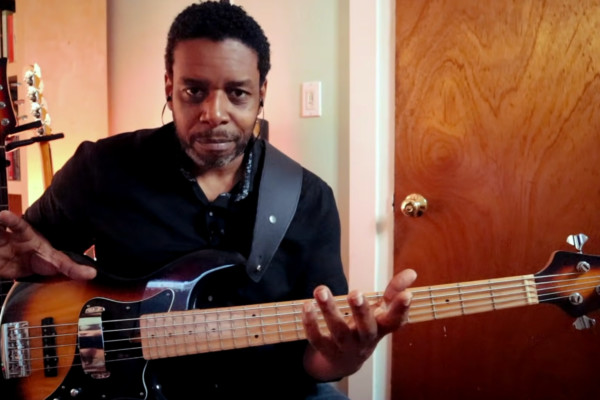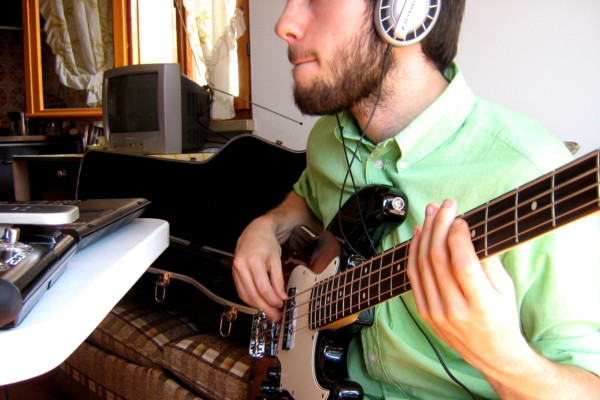Wanna Be Great?
Q: In your opinion, what is it that separates the “greats” from the rest of us mortals?
A: In short, thousands of hours spent working hard at their craft. Great work really is 99% perspiration, and 1% inspiration.
I see this constantly in my students and my peers. The one thing that every great musician I know or have read about has in common is passion. They are passionate about what they do and passionate about doing it to the best of their abilities. They’re never satisfied with where they are now. And as a result? They practice and work very hard to better themselves. The others just simply never get there.
Talent is really just a poetic word for work ethic. Even the greats we’ve read about that could do their thing by age 6 or by age 10. Usually, when you read on (or get the real story) they had that ability not because they could immediately do something that was difficult for the rest of us. It’s because they started even earlier than that and were made to work very hard.
Sure, if you start at 2, you’ll be way ahead of the other 6 year olds. Some guys start late, but develop quickly. They’ve also usually practiced endless hours and it is only a result of that hard work that they developed so quickly.
In my humble opinion, the only thing separating your musical hero from the guy hacking through tunes onstage at any given bar in any given town is the amount of hard work put in and dedication to their craft.
I’m talking real practice here… time spent working on things that they can not yet do and working through problems, not just feeling satisfied because they spent 30 minutes doing something that they could already do last week. It’s the people who see something that they can not yet do and, instead of avoiding it or putting it off, attack it with a ferocity because they just can wait to “get it”.
Love, passion, musical obsession… they all lead to loving what you do and, as a result, one has the ability to work endlessly at it. Those are the people that go on to become the “greats”. Ten hours spent trying to forge new ground and test your limits is worth a thousand hours of noodling and never really pushing your abilities.
There are no short-cuts. If we really want it, we need to work hard for it and overcome any number of obstacles (physical, emotional, spiritual, psychological…you name it) to obtain what we so desperately want. The ability to make magic happen on stage and express oneself clearly and with intention.
I’ve told some students about the 10,000 hour rule that says that, in order to master anything, one needs to spend at least 10,000 hours working hard at it. Some of the students said, “Oh man! that’s impossible… That’s a LOT of practicing!”.
Some of the others said that they felt like, “I’ve only practiced for an hour so far today, I need to get home and get working, then!”
That’s the difference.
Have a question for Damian Erskine? Send it to [email protected]. Check out Damian’s instructional books, Right Hand Drive and The Improviser’s Path.




One could argue that it’s not the the first 10,000 hours but the second 10,000 hours that makes a great player…
If your definition greatness includes fame, you may have a problem. I live in a city full of great bass players and you will never know their names.
10,000 hours is a good minimum ruler but even that wont make you great just proficient.
After 40 years of playing and way over 10,000hrs here’s my take if anyone cares.
To be great you have to transcend from sounding like any one else to sounding like you. when you achieve that fully, I think your great. Not many players do it. Even very proficient ones.
I know some players who are technically amazing and yet are really only playing from the established cannon of jazz. They are not expressing their own voice. Then there’s the ones who play a small handful of notes and make you want to cry or cheer. When you practice do you catch yourself playing the same phrase you did last time? Your not there yet.
Work Ethic/Practice can be EASY… lemme explain:
I’m so glad no one ever told me about the 10,000 hr. rule until like last year! I started playing in ’85 and just didn’t stop, far surpassing the 10,000 hr mark by now. Such a big number as 10,000 has a bit of ‘shock and awe’ to it that can be a mental barrier to some. I’ve never actually counted… is it even possible? I’m glad no one told me that that’s what it’d require though.
I hear a lot about discipline being the way to master something. try to avoid using that word, as I feel it has a bit negative slant to it- as in something you have to do against your natural will or flow.
I then had to ask myself. “why did I play bass ALL the time? Did I not have discipline”? I really don’t think I do. But what I realized is that if you want something enough… I mean REALLY DEEPLY inside your bones and soul want it… then everything you do in your life automatically will align towards that goal.
For example, when passively overhearing a conversation, some examples of words that stand out to me are; tour, gig, bass, namm, show, guitar, band, festival, etc…. For contrasts sake, words that don’t “ping” my radar are; stocks, taxes, health care, realty, basket weaving, gucci, glee, etc…
Goals are important, but they don’t even have to be concrete. For example I had always pictured performing on the biggest stages in the world with a bass since I watched MTV from day one. Everything I did from that day forward made it happen for me. I never really had smaller goals along the way, but that doesn’t mean they didn’t exist. In fact, many of the accomplishments and milestones in your life aren’t planned out first, but looking back we’ve all had them. As long as you have a main vision of where you want to be, and it’s true in your heart, then you’ll get there. There’s no difference between those at the “Top” and you, other than having and living that dream, (or choosing a regular path of punching-in for the man).
I still have never forced myself to sit and play exercises or scales… at least not ones I didn’t have some deep interest in (maybe I need to!). I think therein lay my point… that YES one must have discipline, but it doesn’t have to be difficult… in fact it should be FUN! All one must do is change their perspective to make ANYTHING interesting and fun. What’s the old saying?… something like: “You’ll never have to work a day in your life if you love what you do”… I like that saying.
So I guess in this rambling I just wanted to add to the already great article some thoughts on taking the “work” out of practice. Perhaps offering an alternative POV to the repetitive work/reward ladder, and offering a more holistic approach to getting to where you want to be. Call it a shortcut. Call it a “Way of being”. Call it anything you want, but it has been proven to nicely balance out/compliment other traditional forms of learning. Damian says that alot in this posting- I just wanted to amplify the importance and say that it it turns out that 10,000+ doesn’t have to be “work”. You can do it!
It ain’t work if you love what you’re doing. 8)
yep, to all of the above! ;)
The truth is, who ever has practiced 10,000 hours is the only person qualified to say whether or not 10,000 hours of practice will make you great.
Nice Job Damian. Love the honesty.